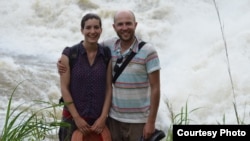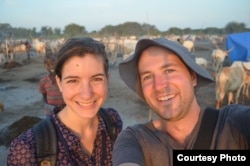When newlyweds fly off on their honeymoon, they head for the sandy beaches of the Cayman Islands, Tahiti, the Maldives and -- landlocked South Sudan?
That's where Australian couple Matthew and Emily Albert headed on their honeymoon, and they came away with enduring memories and some words of advice for the authorities in the world's newest nation: ease up on visa requirements and improve transportation, and South Sudan could become a hot tourist destination.
"We were made to feel very welcome from the outset and got to see a country that is pristine in so many ways -- pristine in terms of not being overly done for tourists but also in terms of the environment and magnificent scenery," Matthew Albert told VOA's South Sudan in Focus.
But just as the couple is likely to face a few bumps and challenges along the (hopefully) long road of marriage, they ran into a few in South Sudan.
"The biggest challenge was transport, just getting from one place to another," Albert said.
"We went to Juba to Bor and to Nimule. The road to Nimule is fantastic so that was very easy. Getting to and from Bor from Juba, though, was very difficult. We flew up, and that was very comfortable. But getting back we decided to take a boat down the Nile River. The trip was very long," Albert said with a wry laugh.
In Nimule, the couple visited the national park, and saw the place where John Garang, the late leader of the Sudan People's Liberation Movement, which fought the government in Khartoum for more than two decades in a civil war that that ended in 2005, hid out during the bitter conflict with the north.
Garang served briefly as the first vice president in a Sudanese unity government before he was killed in a helicopter crash in July of 2005.
Another perk that South Sudan has for honeymooners and other tourists is that it is as yet unknown as a tourist destination. In Nimule National Park, Albert said, he and his wife were able to "see the animals in very close proximity with no one else in the park."
"That is something we'll remember for a very long time. It's an asset that South Sudan has," he said.
The couple also visited a Dinka cattle camp, which Albert said was one of the highlights of the trip.
"I think the people of South Sudan should be so proud of their country," he said.
The government, meanwhile, could do its part to help make the world's newest nation an easier-to-get-to destination for tourists by easing up on visa requirements.
Albert said that, at present, visitors to South Sudan need to have a "letter of invitation" from someone in the country to get a visa.
"But to tourists and most people who want to go on honeymoon in South Sudan, they're not going to know somebody," he said.
"I think it would be fantastic if that little thing could be removed only because it's a barrier to people coming to South Sudan and spending some of their money in South Sudan to help the economy along," Albert said.
Matthew Albert is a co-founder of Sudanese Australian Integrated Learning (SAIL Program), a non-profit set up in 2001 to provide free language tutoring and community services to the Sudanese community in Australia, many of whom are refugees. Albert ran the SAIL Program until 2008. He traveled previously to what was then southern Sudan in 2004 when he worked for the UNHCR.
That's where Australian couple Matthew and Emily Albert headed on their honeymoon, and they came away with enduring memories and some words of advice for the authorities in the world's newest nation: ease up on visa requirements and improve transportation, and South Sudan could become a hot tourist destination.
"We were made to feel very welcome from the outset and got to see a country that is pristine in so many ways -- pristine in terms of not being overly done for tourists but also in terms of the environment and magnificent scenery," Matthew Albert told VOA's South Sudan in Focus.
But just as the couple is likely to face a few bumps and challenges along the (hopefully) long road of marriage, they ran into a few in South Sudan.
"The biggest challenge was transport, just getting from one place to another," Albert said.
"We went to Juba to Bor and to Nimule. The road to Nimule is fantastic so that was very easy. Getting to and from Bor from Juba, though, was very difficult. We flew up, and that was very comfortable. But getting back we decided to take a boat down the Nile River. The trip was very long," Albert said with a wry laugh.
In Nimule, the couple visited the national park, and saw the place where John Garang, the late leader of the Sudan People's Liberation Movement, which fought the government in Khartoum for more than two decades in a civil war that that ended in 2005, hid out during the bitter conflict with the north.
Garang served briefly as the first vice president in a Sudanese unity government before he was killed in a helicopter crash in July of 2005.
Another perk that South Sudan has for honeymooners and other tourists is that it is as yet unknown as a tourist destination. In Nimule National Park, Albert said, he and his wife were able to "see the animals in very close proximity with no one else in the park."
"That is something we'll remember for a very long time. It's an asset that South Sudan has," he said.
The couple also visited a Dinka cattle camp, which Albert said was one of the highlights of the trip.
"I think the people of South Sudan should be so proud of their country," he said.
The government, meanwhile, could do its part to help make the world's newest nation an easier-to-get-to destination for tourists by easing up on visa requirements.
Albert said that, at present, visitors to South Sudan need to have a "letter of invitation" from someone in the country to get a visa.
"But to tourists and most people who want to go on honeymoon in South Sudan, they're not going to know somebody," he said.
"I think it would be fantastic if that little thing could be removed only because it's a barrier to people coming to South Sudan and spending some of their money in South Sudan to help the economy along," Albert said.
Matthew Albert is a co-founder of Sudanese Australian Integrated Learning (SAIL Program), a non-profit set up in 2001 to provide free language tutoring and community services to the Sudanese community in Australia, many of whom are refugees. Albert ran the SAIL Program until 2008. He traveled previously to what was then southern Sudan in 2004 when he worked for the UNHCR.







